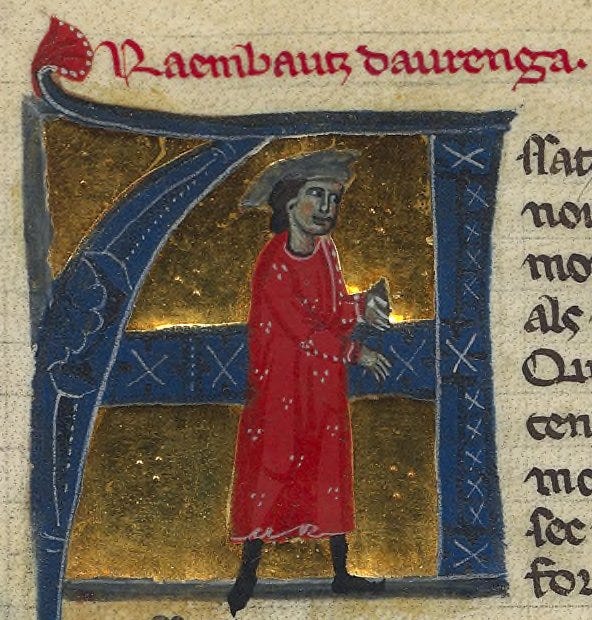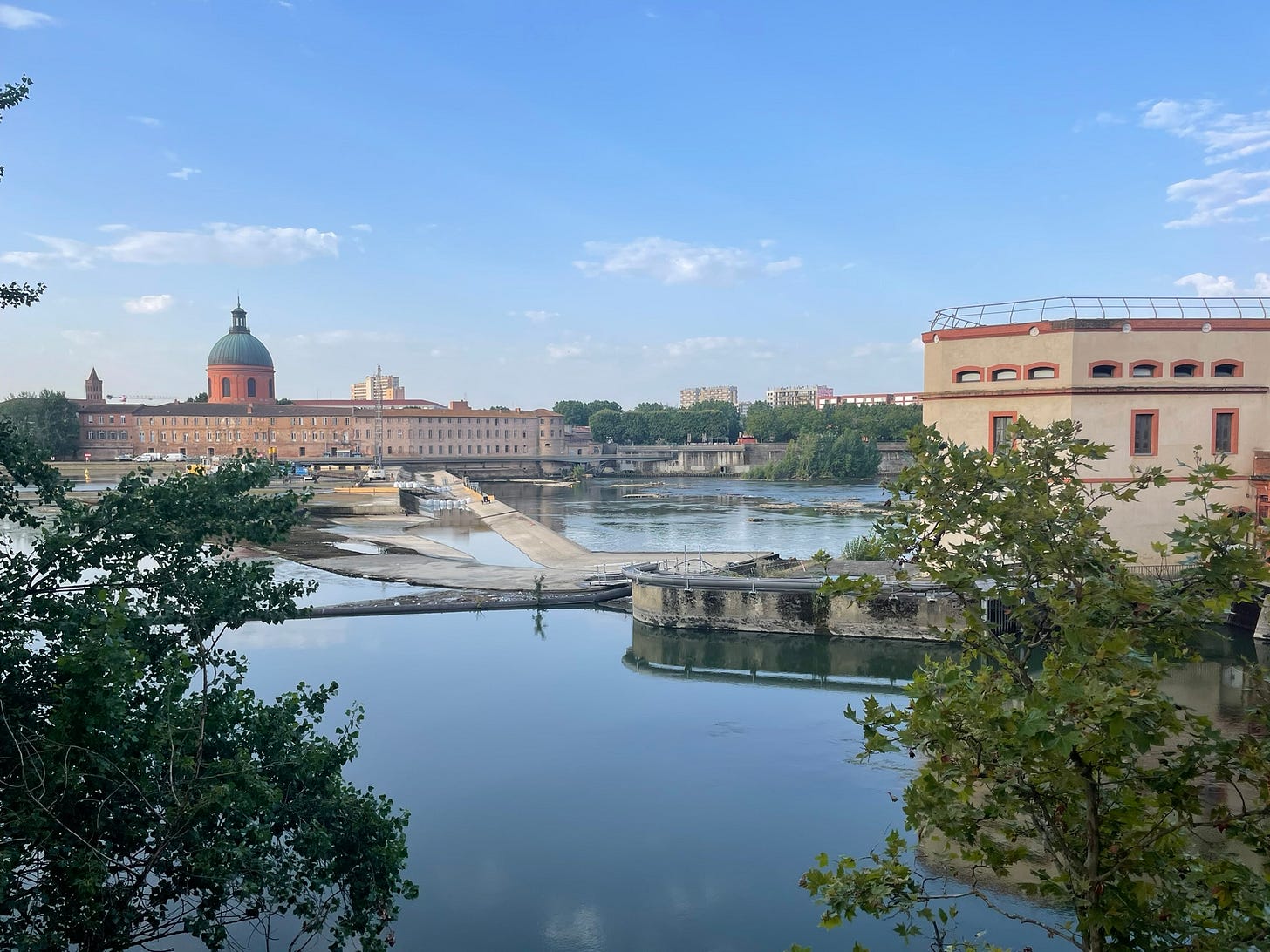The BOOK now having festered unpublished for such a stretch of time that it seems condemned to stay so, I have decided to ‘give up’, at least temporarily, and publish part of its large opening section here. Gironde, a rewriting of Ezra Pound’s lost 1912 travel guide to Provence, opens with 50 or so pages of self-justification, potted history, before the travelogue proper begins in Poitiers, following the route of Old Ez through troubadour country. This opening section is divided into three parts, the first of which apologises for the book and explains its purpose, while the second gives some dates, the third and final part briefly covering the historical background of Pound’s tour, the troubadours of the classic period, and the Albigensian crusade. After this, Gironde becomes a straightforward travelogue following Pound’s route through Provence. I have not yet decided whether to publish the travel guide section as a series of paid posts or wait to see it in print. Either way, the first part of the opening section, titled in the book A Warning, is here. Look, now:
Escotatz, mas non sai que s’es,
Senhor, çò que vuèlh comensar:
Vèrs, estribòt ni sirventés
Non es, ni nom no∙lh sai trobar,
Ni ges non sai co∙l mi fezés.Listen – but I don’t know what it is
Lord, which I wish to begin
It is not verse, iambic, or sirventes,
Nor do I know its name
Nor how to make it
Raimbaut d’Aurenga
A warning
Prose has commercial value, increasing according to its worseness
Ez, 1912
Facts: In 1912 Ezra Pound walked from Poitiers to Clermont-Ferrand by way of the Limousin, Languedoc, Provence and Auvergne, visiting sites from the lives of the troubadours. He then, following harsh feedback from Ford Madox Ford, destroyed the proofs for a long prose work based on the trip. The notes somehow survived and were published eighty years later. I do not like the distinction between work and notes for work, this document having been both; Pound’s notes were written with an audience in mind, he talks to himself authoritatively, and when his notes were eventually published, they cohered reasonably well into a little book. As to my own, I have called it ‘the book’, it has been accused of being a thèse, a vanity project, a doodle. I have not unearthed anything new, nor intend to, but arranged some things I like in an order I somewhat like, somewhat by accident.
I normally describe this Word document as being ‘about Ezra Pound’, sometimes ‘about the troubadours’; it is both, but a digression, the thread too broad to really be about anything. Ezra Pound’s verse is not immediately attractive except in fragments; his main work requires a significant investment before it can begin to bear fruit, being as it is one man’s map to Parnassus. This particular characteristic of Pound can make him an expensive distraction, and some will hate him for it; the enemies of love and music are slaves to directness, and cannot bear to walk around things. Ezra Pound viewed coincidences in his life and reading as intensely meaningful. Tracing back a succession of them gives us a guide to his long poem, and the attempt at renaissance behind it.
English is not a classical language, and Pound, who grew up in Philadelphia dialect, had a harder task than his models. Dante took a highly developed conversational language and made it a monument – he was not forced to produce a usable language before he could skipper his poem. To go back to the beginning, Pound traced a mediaeval trunk, its taproot the old Provençal singers. These were the same waters Chaucer drank, when he took his turn at finding a functional, poetic English; Provence came to him via North France and Italy, to Pound directly, but obscured by scholarship. Pound succeeds, eventually, in forming a new language for poetry, but much of the mass left to us is undigested. Accordingly, his Cantos demand things of us before we can simply enjoy them.
Some poets can be picked up, lightly read, enjoyed for their melody without great difficulty, and then left; they are our trobar leu, the direct and popular style of troubadour song, and by no means the least skilful. But Pound is one of those who leads us off, an expedition to uncharted territory, he is trobar clus; the opaque, obscure style, and opposing school to leu. At times he approaches the trobar ric – contorted verbal acrobatics – a habit he slowly grows out of, but that was still everywhere in his 1910s work. But the benefit of his half-digested mess of citation and repetition is it gives obvious threads to follow, most of which are fruitful, the best of which far exceed him.
Most people who are ‘into poetry’ share a similar experience, where a particular writer plays the role of guide, the would-be initiate following the tastes and influences of their unwitting master until the mass of half-heard names that make up Litterachur falls into pattern. Pound is entirely unexceptional in this role, and similar voyages are possible following any sufficiently grand poet. Pound did not awaken me to the possibilities of poetry and when I first fell across him he was unimpressive, his contemporaries more immediately attractive. But impressions are changeable: Auden, nice as he was, constantly wrote the same poem, and could not find the necessary reservoirs of homosexuality or Communism to lead me anywhere; Eliot I found more fruitful, but I was misled by him into considerable wasted effort reading ‘Anglican devotional verse’, for which I will never forgive him. I also dislike his persona, as most people finally do; it is false and hypocritical, religious doktorin’. The kind of post-belief Christianity expressed today on a million personal websites, in poetic, sometimes explicitly Eliot-ist language, strikes me as that of a soul who looks at reality and flinches.
Without falling into the 1990s offence of confusing the minor with the major, that leaves one real choice for the generation-and-a-half who most retain their fatal grip on ‘contemporary’ poets. Perhaps received opinion, perhaps reality, Pound’s world seems fully real and alive in a way post (that) war poets seldom do. Not long after he is dead we are in ‘isolated incidents’; Matthew Mead and the gaggle of poets who escaped the America ridiculous, England dead pattern refused, probably on just principle, to play movements, something the young Pound loved and that cemented his repewtation. Arriving as he does on a cloud of associations, my early impressions of Pound were uncomprehending amusement, his character as attractive as his verse. This is a common fate if you start reading the Cantos; what is excellent in Pound either requires extensive ‘context’ to enjoy beyond mere sound or is hidden away in reams of apparent nonsense; clus.
Troubadour manuscripts begin with a vida, a prose biography, and so will ours: Massa Pound – no poet, maybe no man has been more finely misremembered than he is. He was a committed fascist, a trait now deformed into the sole fact of his biography, but once upon a time explained away by friendly, embarrassed pupils. Pound was an early and noisy supporter of Mussolini, and many of his pre-WWI friends were fascists by interest and disposition ‘before it was a thing’. As war closed in, he began a qualified defence of Hitler, criticising the general public for their ignorance in not having read Mein Kampf. At points his sanity is in question, but this was not a derailment: Pound’s poetry is explicitly political from a very early date; many of the masks in early poems are pro-war, anti-Christian and anti-Semitic.
Regardless, he was never orthodox; his justification for his politics rests on obsessive ideas about social credit, his early views shaped by the bluestocking humanitarianism he found in London as a young man. Pound gets called upon by his spiritual inheritors as a ‘radical inspiration’, an aggressive partisan of the NEW, but in 1912 he was a different man completely, a medievalist with a penchant for silly hats. Even much later, he avoids the excesses of self-conscious modern stylists; for him our mode of life begins in the 12ᵗʰ century, and the political concerns that led him to Mussolini – usury and the status of money – are mediaeval questions. We don’t have to judge his dream on practical grounds: Aquinas’ near-blanket denunciation came just as the last significant troubadours died, and was equally divorced from economic reality; Dante damned usureres without any awkward mention of his family’s involvement in the money trade.
Especially in 1912 but really throughout his life Pound was an archaizing poet; he only adopts a modern form when it can be made to fit with one of his (broadly defined) classical models. You cannot imagine him saying we should talk about poetry the way we talk about pigs. Politics saturates his verse, for all his alleged and real elitism he is aggressively middle class, vulgar, a populist who mixed verse with the pamphlet, the form that absorbed most of his energies, freely into and out of each other. He interprets Mussolini’s polite small talk as state sanction, and though he is rebuffed from meeting Roosevelt, succeeded in forming a not (entirely) one-sided correspondence with several American representatives, some British MPs, and many Italian ones, including Fernando Mezzasoma, deputy secretary of the Fascist Party under Salo. There is a comically grandiose strain to his politicking, one he shares with the troubadour Peire Vidal, a furrier’s son who, after convincing himself he would inherit the Byzantine empire by fortuitous marriage, berated Azalais de Marseille, his patron’s wife, for refusing the advances of Peire Vidal, Emperor.
Pound, as you may know, began the Pisan Cantos on toilet paper, after a 15-day spell locked in an outdoor cage at Arena Metato, the Tuscan village north of Pisa where a US military prison camp was responsible for holding American criminals from the Mediterranean theatre. This was separate from the US-managed concentration camp at Coltano just to the south of the same city. In his lifetime, Pound was criminalised for his views to an extent rare outside of France. Compare Francis Stewart, who did the exact same thing and was feted, or Yeats, who agreed with them both; there we may cite Irish privilege, but Ez’s incarceration was as grave an abuse of psychiatry as anything that happened in Soviet Russia, and backslapping ‘we didn’t shoot him’ (implied a mistake by recent critics) is moronic.
Our story takes place before both wars, so we can leave this now and continue. His later political career is of limited but real relevance: there is an unbridgeable gap between 1912 and even the inter-war phase of Pound’s life, as there is for European life in general. 1912 saw the man 26 years of age and still casting about for models. Later, once he had worked through his historical impersonations, his ‘poems about writing poetry’ – towards the end of the 1910s – he found himself in need of new material. His nascent historical interests, fed by the 1912 trip, provided it. A bit like James George Frazer (Pound spells it Fraser) or Darwin before him, two named and serious influences on ‘modern’ poets, he works by daubing a succession of anecdotes, placing them next to each other with minimal comment to the reader, then providing the thread of his argument as a flash, illumination. This builds up a huge pressure of economic and historical digression, though unlike those two writers he can never perfectly deliver his idea. The poem dissipates, things fall apart, and Pound retreats into memory.
The turn of the century saw a plethora of scientific treatises on poetry and versification. All of his contemporaries were pushed by this tendency towards practical and (mock) scientific detail, a tendency felt equally strongly whether they accepted or rejected it. Pound knew how to position himself in front of alleged movements, how to use journalese without dirtying the unchanged business of versifying. His method was to create a network of inconsistent and contradictory radicals, to reject the generation before him for reasons of self-promotion, all while presenting both moves as aesthetic doctrine. It is clear from his verse and the tone of his criticism he was breezily above believing his own cant. His escape was cunning.
Originally seen as an explicitly Victorian poet, Ez places himself in the first rank of ‘Moderns’ by games, a practical joke he pulls off without contamination. In his prose Ez contradicts himself systematically, often gleefully, dropping into dialect to deliver his weightiest remarks, a sense of humour about himself that can’t really come across in the Cantos, or comes across only occasionally, and always in character sections. Those ain’t buttons, thems bobbles. That doesn’t mean he wasn’t new, or that the Cantos shouldn’t be taken seriously, much less that the early poems or ‘historical’ Cantos are bad, though they are few peoples’ favourite. Pound’s archaism is technique, and his anecdotes always serve a purpose, never descending into local history like the imitator Olson. That Fat American Grunter – not to be confused with the Fat Man, Pound’s mock-mocking nickname for Ford –– a man he was in truth intimidated by – denied this charge and is usually defended from it. But if you have to deny an imitation, especially an imitation of someone you knew personally, you’ve no real defence. Olson’s poem, which I freely admit to mild enjoyment thereof, is a key plank into the loathsome cottage tradition of microhistory (see also Montaillou, village Occitan), and exists within that mid-century collective decision of the ’hackademy, to be boring on purpose.
Recreating Pound’s book from his sources and notes is, I hope you will accept, not a mere literary holiday, but key to the hoary old gate, those ‘Cantos’, the crags that cranks climb. Towards the end of Ez’s long poem, in the paradiso, Provence reappears, specifically in the guise of the walking tour… But that is getting ahead of ourselves. It has long been obvious to me that the most important — even underrated — literary genres are the most self-indulgent. In my youth I would explain shocking and bizarre habits like urinating into cups and setting fires as important things done in preparation for my autobiography, and only slightly below autobiography on the indulgence scale comes travel guide, a genre perfected by wonderfully conceited men like Sterne. Pound was a provincial boor, whereas I am merely a suburban one, forced to concede space to the boss, and my insightful personal reflections are mixed in with faits divers about the troubadours, and about Pound, many of which are even truthful.
That out of the way, we return to Pound’s poems, which I became interested in during the last fumes of adolescence. With the Cantos, as with things in general, the most obvious ones are the best: I always liked the first, XXXVI and the one about usury; in fact I liked all of the Cantos with recordings online, the others taking longer to appreciate. The poet’s value, like anything seen from sufficient distance (and almost everything is, now) requires a prior acceptance of its merit before you can justify spending enough time to enjoy it. So the most essential, and most accomplished parts of his poem are always the easiest.
There is also some good fortune, in that Pound is close enough in time to have been made permanent. His recorded recitations, sadly arriving in the vocal weakness of advanced old age, are the exact opposite of the bored drone adopted by other Important Literary Figures when they achieve their highest aim, ‘being occasionally talked about’. Pound, commendably, has no stink of Radio 4 about him. Accordingly, he is more liked by poets than by the general public; few of his admirers have not at least tried to write themselves, and I am no exception (you may read some here and here).
Cantos are metred poetry, but constructed in such a way that you can’t easily explain them with simple abstraction or a metronome. This leaves them useless without a skilled reader and normally hearing them first; for this reason they will not survive except as a curiosity. Pound’s fame is already descending into a vague awareness of his person rather than a direct relationship with his work. (This semi-recollection is of course the best way to guarantee survival – the fewer people read the poems the more famous the poet can comfortably remain).
I do not share all of his interests, but we had enough in common (I forgave him Rosetti for giving me Swinburne) that something more concrete began to take shape. Forcing my way, badly with second-hand books, through his claimed antecedents, melodious nonsense gave way to something clearer and more satisfying. Slowly but surely, the bones dragged up from his grave started to crack and yield their delicious marrow, and Pound replaced his contemporaries as ‘my favourite’. He pushed me further into the arms of the troubadours, who speaking a dead Romance language fairly similar to several living ones, were much more rewarding – and much more quickly rewarding – than long-running horror shows like ‘Greek’ or ‘Beowulf’. For Pound the troubadours, via Chaucer and half-repeated by Campion, are our ultimate source:
European civilization or, to use an abominated word, ‘culture' can be perhaps best understood as a mediaeval trunk with wash after wash of classicism going over it. That is not the whole story, but to understand it, you must think of that series of perceptions, as well as of anything that has existed or subsisted unbroken from antiquity.
Pound, somewhere.
Since the troubadours are the first coherent vernacular literature, and the direct or indirect model for all subsequent European poetries outside of Scandinavia, there is our mediaeval trunk. For Pound, the job of the poet is not to decorate a ‘tradition’ with flowers, or worse, to preserve it, but to break off the wood and start carving. Provence provides the original and most natural model for all subsequent verse: it is here he begins, and he returns to Bertran de Ventadourn on the final page of his Cantos.
Pound tried to immortalise himself in verse, he thought a lot about his death; about how he would be remembered, about the Europe he was self-consciously on the periphery of, about the possibility of a renaissance, his own role in it, about promotion and about fame: If a man writes six good lines he is immortal – isn’t that worth trying for? He wanted, or one of his children did, the monumental head by Gaudier-Brzeska to rest on top of his tomb in the Sud Tyrol. Instead he has a stone plot in Venice next to his mistress, Olga Rudge. Some quotes are too obvious. He made a gamble that Mussolini would be his Malatesta, patron and protector, on a far grander scale; Il Duce would usher in the ‘new age of man’, first announced in the vortex of pre-war London, now born in Rome, to be proselytised on radio till even his half savage country was saved. Pound would be court poet, trusted advisor, voice in the American desert. At points he can believe his fantasy; in the end he finds himself in a worse position than the troubadour Guy de Cavaillon, who fought and sang alongside Raymond VI until his death in the Albigensian Crusade; or Guy de Figueira, the poet who sided with Toulouse, railed against the French, then with equally vain justice in the service of Frederich II Hohenstauffen against the Pope. Pound’s plans fail with Mussolini, and once he accepts this the Cantos change into another poem. Noel Stock, or someone like that, claimed the Cantos ‘lost their centre’ after Mussolini died.
But the troubadours and Provence – in Pound’s mind the entire Occitan-speaking region – are central to his idea of renaissance; he believed that all modern European verse had these poems, only thirty or fifty or so of importance, at its root. The influence of the troubadours is most obvious in his early poems, many of which are direct translations, or use Bertran de Born, Peire Vidal or Arnaut de Mareuil as mouthpieces. But first: Ezra Pound would be a minor poet had he not written the Cantos, and the trip’s notes an unpublished curiosity. But write them he did, and 1912 is both a topic in the Cantos and a key part of his development towards them. The original opening of Canto I went as follows:
I’ve strained my ear for -ensa, -ombra and -ensa
And cracked my wit on delicate canzoni.
Here’s but a rough meaning:
And then went down to the ships…
Provence is then present from the opening demonstration, a process he refers to as ‘selecting his palette’, providing rough daubs of the different poets and places he wishes to call upon. First, in Canto I’s descent into Hell, he gives us his literary modes; Anglo-Saxon alliterative verse, Homer (specifically the Odyssey), Ovid, Provence, Dante, some of these logically linked and others simple accidents. This complete, he successively introduces us to his heroes, while giving a bizarre lecture on world and economic history, one that starts in Italy after the mythological Greek prelude, and takes us through Revolutionary America, the 19ᵗʰ century Western frontier, a Hellish interlude apparently in London, then France, Japan, Italy, China, all interspersed with long attacks on Jews, London literary types, the British elite, usurers, newspaper men, financial speculators, papists, arms manufacturers, and finally, lucidly, himself. Forced to completely reappraise the project during his capture and exile from Italy after the war, life overtakes him, and the plan is in pieces abandoned as personal themes conquer the end of the poem, his attempted paradise. The final Cantos are frank nostalgia – a feeling 1912 Pound claimed he did not care to cultivate, but where the walking tour takes on its highest importance, as entrance to the paradiso terrestre.
Ez meanders, he piles things up, changes track abruptly, moving on unannounced only to pick up the abandoned notes, thoughts pressing irrelevantly from all sides. He changes his models throughout: early on the Cantos were going to be a new Sordello, but Pound has too many devices to play a straight biography, instead we get, non-exhaustively; Odysseus, Sigismondo Malatesta, Thomas Jefferson, Mussolini, Bertran de Born, his grandfather (maybe it was his great uncle), Dante, Duke Leopold II, legendary Chinese emperors Yao and Shun, all appearing without warning and playing (for a while) the leading role. Behind some or all of them lies himself, a fact he eventually acknowledges. But many of these choices are random – the dictates of bookshops and fortune, like his preference for the Odyssey over the Iliad. Stood at a Seine-side bookstall in 1910, Pound ended up buying Andreas Divus’ word-for-word transliterated Latin Odyssey, one half of a two-part set with his Iliad, unable to complete the purchase through lack of funds. Book 11 then becomes the first Canto, Divus’ Latin refracted through Old English.
Inaction is always the greater evil, so Pound jumps and changes tack when one of his systems fails. Even if his ideas in 1912 were confused – his conversation on arrival in London heavily featured spiritism and even palmistry – his models never are: the Cantos are stylistically coherent and show a fixed, consistent skill. But at the time of the walking tour, still three years before he started the eventual Ur-Cantos, this was absolutely not the case. In his collections of the era, taking us through Canzoni, Ripostes, and Cathay, there is continual development, obvious influence, undigested reading, and stylistic disorder. Part of how he arrives at his mature style, not the key part but a major one, is to be found in the trip to Provence; 1912 a pivotal year for the young poet.
Pound probably had good reason to destroy the manuscript for his book, if it has indeed been destroyed. The obvious way to honour his memory would be to do the same — a Chinese painter lamented his apprenticeship spent copying the work of great masters, when he would have been better served studying nature, and better still by looking into his own heart. This project is firmly in the lowest of the three categories, and with good reason: my book is undesired, if unreproved, while an(other) ‘Ezra Pound Book’. will at least guarantee my audience a few dozen fascist poseurs. To those, I promise you will come away thrilled, full of the formless, unspecific excitement that only vital energy can provide. And the form it takes? This is a travel guide. I was strongly influenced by Mr. Land in my early 20s, and believe there is no point in false authority – we are swiftly approaching a time where a passable ‘academic study’ can be produced with the press of a button, so there is no interest in my adopting the view of God over the topic.
Pound’s book was a travelogue too, and though he theoretically used Sterne’s Sentimental Journey, Smollett’s Travels in France and Italy and Heine’s Harz Journey as models, even stealing an anecdote about saving a drowning dog from the latter, in practice it appears to have turned out more like Smith’s The Troubadours at Home (which becomes our second guide, after the notes) or Raymond ‘de Loi’ Jameson’s Trails of the Troubadours, than Heine. As always, Pound is in revolt against ploddery, so his stated models and principles are nowhere to be seen (letter to William Carlos Williams – I have sinned deeply against the doctrines I preach). Gironde, at least the partial notes of it, is fragments: unmistakable, ranting, lapsing into and out of personae. Wyndham Lewis thought Pound ‘authoritative, if not pontificatory’. Thus by the timely expenditure of 2.50 francs were these inestimable memoirs continued to the pleasure and instruction not only of my own generation but of many who shall come after me. At times the temptation to copy this has been overwhelming, and the sin stains me to such a base level it is hard to fully edit it out.
Without serious guidance beyond the fragmentary notes, it has fallen to Pound’s named models to provide my own – I have done what I can to copy his reading –– to copy, faithlessly of course ––– his patterns of influence, and to use them –––––––––––––– with varying degrees of subtlety ––––––––––––––– to create something I can call an approximation, something I can finish with. Doing as he says and not as he does, taking solace in my models’ excuse for sloppiness, I feel no reason to apologise for a lack of expertise – more contempt should be loaded into the three syllables grad student that most others, and stress this book has no pretensions to scholarity, nor anything else of its ilk.
Instead, I will sing you terraces, where you may sit and drink passable rosé. Old Ez – I will use this name intermittently, and can only offer limp apologies – is not humourless (read the first line of Canto XIII after finishing XII), though his reputation and actions sometimes suggest it. Even so, he is a gracioso but not merely a clown, and throughout this this we will struggle with quips where I begin a thought, and perhaps unable to adequately finish it, tail off into a joke. I shall try to avoid this, but warn the reader not to take too seriously any of the following content, especially not my own deranged literary theories passed off as belonging to Ezra Pound. Pound did indeed travel through France in 1912; treat any claims beyond that with suspicion. My dream is that you will read this on holiday, glass in hand, mineral suncream adequately supplied. Many of these cities are wonderful places to visit for a few days. I would not advise following yours truly and relocating.
I will begin by saying who the troubadours were, what the Albigensian crusade was, and so on. To do so with Pound would be ridiculous – there are limits to your imagined ignorance – so if you are simply reading because you like France, then all you need to know is he was a poet and a useful foil for a holiday. If you already know more, perhaps I will have found something that escaped your no-doubt immaculate attention. If not, you should have just skipped to ‘Part One’.








"Tant m'abellis vostre cortes pensamens," to paraphrase Dante paraphrasing Folquet.
Is there any chance of you serialising the book on Substack?